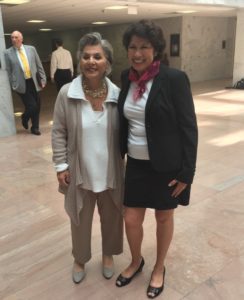Making up roughly 20% of the US Gross Domestic Product (GDP) or $2.6 trillion, the retail industry contributes and supports the livelihood of many American workers today.
One in four American jobs are in retail – that’s roughly 42 million US jobs. The make-up of the retail industry is a microcosm of US small businesses: about 98.6% of all retail businesses employ fewer than fifty (50) employees.
Retail does not just encompass sales jobs: retail-supported jobs include positions in logistics, technology, management, finance, insurance, real estate and healthcare.
The industry has been deeply affected by recent economical events (our post 2008 downturn world), changes on how we make purchasing decisions (online shopping for convenience versus brick & mortar) and other technological advances that have forced retailers to transform how they do business.
At the recent National Retail Federation (NRF) Advocates Summit in Washington DC, retailers from around the country got together to exchange their stories and best practices. We learned about recent legislation affecting the retail industry and met with our representatives in Congress and the Senate to tell them our stories and how legislation affects our businesses.
We also talked about the state of traditional retail, especially in respect to recent events such as the less than stellar performances of large retailers (Nordstrom, Best Buy, Walmart, etc.), and the closures (Sports Authority) and downsizing (Macy’s) of others.
Some of the key issues covered during the conference are summarized below.
Sales Tax Parity
In the Holiday 2015 shopping season (October – December), for the first time e-commerce sales in the US surpassed brick and mortar store sales. For many traditional retailers, this meant lower sales than past seasons. It also further brought to light the uneven playing field for traditional brick and mortar retailers who are required to collect state and local sales taxes versus online stores who are currently not required to do so from out of state customers.
The Remote Transaction Parity Act (HR 2775) was introduced in the House of Representatives in 2015: it provides a framework for online retailers with annual online sales of $10 million or more to collect state taxes on sales made outside of their domicile state. According to arguments for this legislation, all retailers, whether brick and mortar or online will have similar requirements to collect sales tax, providing a more level playing across the industry.
Overtime Rules
In 2014, President Obama asked the US Department of Labor (DOL) to review overtime rules. In 2015, the DOL presented their proposed federal ruling which included increasing the threshold of exempt employees eligible to earn overtime pay from $23,360 annual salary to $47,446 annual salary. There are also indexing requirements in the proposed ruling that will increase the threshold to $50,446 annual pay by 2020.
After a short commentary period, the DOL has proceeded to implement the rulings, requiring all businesses to comply to these new regulations by December 2016. The impact to the retail industry is currently under review. NRF is asking DOL to delay the implementation of the new ruling until its implications are better understood.

Vivian with Senator Boxer in Washington DC
Electronic Merchant Vendor (EMV) Compliance Mandate
In October 2015, all merchants were required to switch from the swipe technology to a chip card reader as part of the effort to increase credit card security for customers and merchants. As of mid 2016, many merchants still have not received the updated hardware, software and/or training from the credit card companies in order to meet the requirements. This has proved to be a point of contention for retailers.
Credit Card Swipe Fees
According to a recent survey, credit card swipe fees are the second highest costs for retailers after labor costs. Recent proposed legislation by House Financial Services Chairman Hensarling (R-TX- 5), known as the CHOICE Act, aims to repeal and replace the Dodd-Frank Wall Street Reform and Consumer Protection Act of 2010, including a repeal of Section 1075 of the Act, known as the
Durbin Amendment
The Durbin Amendment allowed for a cap of debit card swipe fees charged by card companies and their banks. The savings seen in this act has been estimated to be in the billions for both merchants and consumers.
Cyber security
NRF recently instituted its Threat Alert System that facilitates real time information sharing on cybersecurity attacks affecting thousands of retailers (and millions of their customers) each year.
For more information on these issues, please check out the NRF website at www.nrf.com/advocacy
________________________________________________________________________
 Vivian Sayward is the Founder of Vivacity Sportswear®, a San Diego-based producer of women’s activewear featuring performance fabrics, Swarovski® crystals and the finest craftsmanship from Southern California designers, pattern makers, cutters and sewers. The collection combines sport with haute couture; head-turning silhouettes with everyday comfort; and refined detailing with wicking, anti-microbial fabrics. Every piece is handcrafted in San Diego, and designed to comfortably go from course to office to cocktails.
Vivian Sayward is the Founder of Vivacity Sportswear®, a San Diego-based producer of women’s activewear featuring performance fabrics, Swarovski® crystals and the finest craftsmanship from Southern California designers, pattern makers, cutters and sewers. The collection combines sport with haute couture; head-turning silhouettes with everyday comfort; and refined detailing with wicking, anti-microbial fabrics. Every piece is handcrafted in San Diego, and designed to comfortably go from course to office to cocktails.





